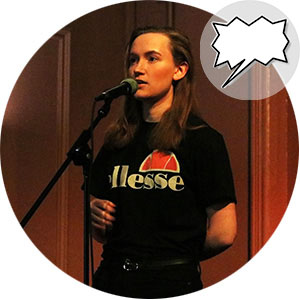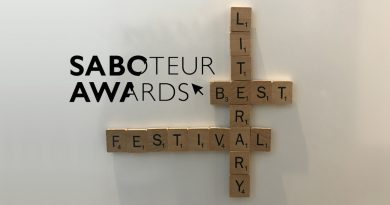Spoken Word Playlist #3: How are poets adapting to social distancing?
– Written by Hannah Ledlie –
For many poets, tangible live events act as muse, paint, canvas, gallery and appraisal. Open mics in particular don’t simply offer participants a chance to either perform or to listen. They are locations which facilitate an exchange of information, emotion and ideas. A poet can be inspired by, write for, perform at, find context through, and receive feedback via, a single live event. Furthermore, the geographic and temporal regularity of many events create a wonderful continuity. The same people attend, learn from each other, separate, develop their individual crafts, then reconvene. As the process repeats the community grows collectively: a school of artists.
Given that scientists are estimating a Covid-19 vaccine will not be available until well into 2021, it is easy to despair at the loss of such artistic experiences. That’s to say nothing of the financial loss cancellations have incurred for many creatives. However, if there is a silver lining, it is that poets have been forced to find and develop alternative ways of continuing their exchanges. New canvases, new galleries.
Anyone seeking to facilitate poetry in the digital world of lockdown must start from a place of comparison and introspection. What are the essential elements of a ‘normal’ poetry event? What can be recreated, what can be left behind, what entirely new materials can be used? Why was the normal ‘normal’ in the first place? These questions will make us more mindful creators in the long term, informing our work and events in a post-Corona landscape. As Harry Man writes in his essay ‘Computer Says “O”: On Using Technology in Poetry’,
‘Computers are our facilitators and simulators, broadening the idea of what a canvas for a poem looks like… We are incredibly fortunate to be among the first artistic explorers within this new artistic terrain.’
It’s been heartening to observe the resilience of poets and organisations at this time, and the sheer variety of approaches has been fascinating. Some hosts have attempted to continue their events with as little change as possible. Regular Leicester poetry night, Find the Right Words, has adapted well by transforming into a pre-recorded podcast. Host Jess Green maintains the night’s usual structure of open mics, features and ‘speed poet’ slot, and has even managed to continue the night’s popular raffle via Facebook Live. Listening to the May edition, featuring Malaika Kegode and Agnes Török, I was struck by how well the podcast recreated the sense of attending the physical event. Over the top of a bittersweet guitar and drum riff, Green begins the episode by describing in great detail your journey into the venue. The description perfectly matched my own experience of attending in person a few months prior, and the sense of nostalgia it induced actually made me quite emotional. The open mic was also one of the strongest I’ve ever heard, perhaps because, as Green noted, ‘lots of people who can’t make it to the night when we do it live are able to contribute virtually, so we’re getting to hear a real range, a real eclectic mix of voices.’
Also making the jump from stage to audio are spoken word shows such as Make/Shift. Written and performed by Bibi June and Ross McFarlane of In the Works, the piece follows two flatmates working odd shifts and explores the socio-economic struggles of today’s young people, their resulting pessimism, and the importance of found family. From April 2019 the pair toured venues across the UK; I caught the show in Birmingham and was impressed by the clever use of staging. A moment that stuck with me was when the two turned their backs to the audience and had a tense, candid conversation about their relationship with their parents, while one mimed washing dishes, the other drying. June and McFarlane’s perfectly choreographed movements – the miming of a glass being washed then passed to the other – provided an interesting counterpoint to the sense of conflict and disconnection. Naturally, these moments of detail are lost in an audio-only version, however, the new format also allows for effects not possible in the original. While a noisy pub venue might drown out the occasional line, nothing is lost in the crystal clear recording, and the subtle backing track of sound effects and melody elevates the emotional impact and strengthens the illusion of different settings.
While some poets have adapted their existing work to fit digital mediums, others have used this time to found entirely new projects. One great example is the fortnightly show radio podcast, Alone Together. Producer and host ThinkWriteFly (Adrian Earle) sets themes and asks poets to send in voice recordings, which he then layers sound upon to create entrancing, 10-20 minute episodes. The lack of applause or extensive introductions, which you’d expect at a live event, means there is a far greater sense of flow and the listener becomes totally immersed. Returning to the art metaphor, now is a good time to note that as the canvases and galleries change, so do the creations. It’s difficult to perform a highly physical poem in front of a webcam for a livestream, or a call-and-response piece for a pre-recorded podcast, but equally, these mediums allow for experiments that would be tricky on a stage. The poems in Alone Together are distinctively gentle and measured. In the absence of visual cues, volume and tone are foregrounded more than ever.
Another of my favourite new projects is the ‘Haiflu’ project, where poet Liv Torc commissions haiku and photographs about ‘Covid life’ and curates them into weekly films, often set to original music by Richard Monks. Haiku, a micro form, ironically give writers the space to distil and make sense of huge, complicated situations and emotions.
checkerboard pavements
knights and rooks wait outside shops
patiently queuing
by Arian Jan Power (Haiflu episode 2)
The result is a truly moving series documenting changing attitudes and circumstances as the months stretch on: the initial shock of isolation, the silver linings, the growing despair. Many of the poems are intensely political too, recording the government’s fatal indecision and inaction, Dominic Cumming’s illicit excursions, George Floyd’s tragic murder and the resurgence of the Black Lives Matter movement.
It’s not just performance that’s had to migrate online, so has the social and educational side of poetry. Debris Stevenson has continued to offer excellent workshops through Instagram Live, and more recently has begun a series called Justice Write Now. Every Wednesday from 12pm, Stevenson runs ‘30min writing workouts profiling black writers and writing as activism.’ A brief technical difficulty at the start of the first instalment highlighted the risk that all livestreams run, but such issues are a small price to pay for the energy and immediacy the medium provides. I would thoroughly recommend Stevenson’s workshops for anyone struggling to write in lockdown. As the poet encouragingly responds to comments and questions in real time, you gain the sense of being part of a real group, creating some much-needed social pressure to make you put pen to paper. Stevenson also provides a space to reflect on and unpack the traumatic racial injustices one witnesses or experiences first-hand, and to learn about Black writers who have been exploring these topics for years.
When it comes to the number of poets successfully adapting to social distancing, this article has only scratched the surface. And perhaps as poets we have only scratched the surface of our true digital potential. While many have incorporated technology into their poetic practises for years, as Man notes, in the grand scheme of things, we are all very new to working digitally. There are lots more experiments to be conducted. One benefit of lockdown might be an acceleration of this development. Another is that we are less alone in the process. Poets are talking to each other more than ever before. We no longer confine ourselves to our local bubbles, instead hosting events and joining Facebook groups and Zoom calls with poets from around the world. Let’s hope these positive changes will endure longer than Covid.
Projects and performances mentioned:
Computer Says “O”: On Using Technology in Poetry’
Justice Write Now / Debris Stevenson

Written by Hannah Ledlie — Originally from Edinburgh, Hannah is a Birmingham-based poet interested in ideas of dystopia, sexuality and belonging. In 2015 she was shortlisted for the BBC Young Writers’ Award, and as a member of the University of Birmingham’s poetry team she came first place at UniSlam in 2018 and ’19. In 2019 Hannah was also a member of the winning team at the Hammer & Tongue National Team Slam Final, and won Platform Penguin’s spoken word competition. When she’s not writing, Hannah enjoys watching way too much Drag Race, and admiring dogs while going for walks.
Email Hannah: [email protected] | Twitter: @HannahLedlie | Web: hannahledliewriting.com



